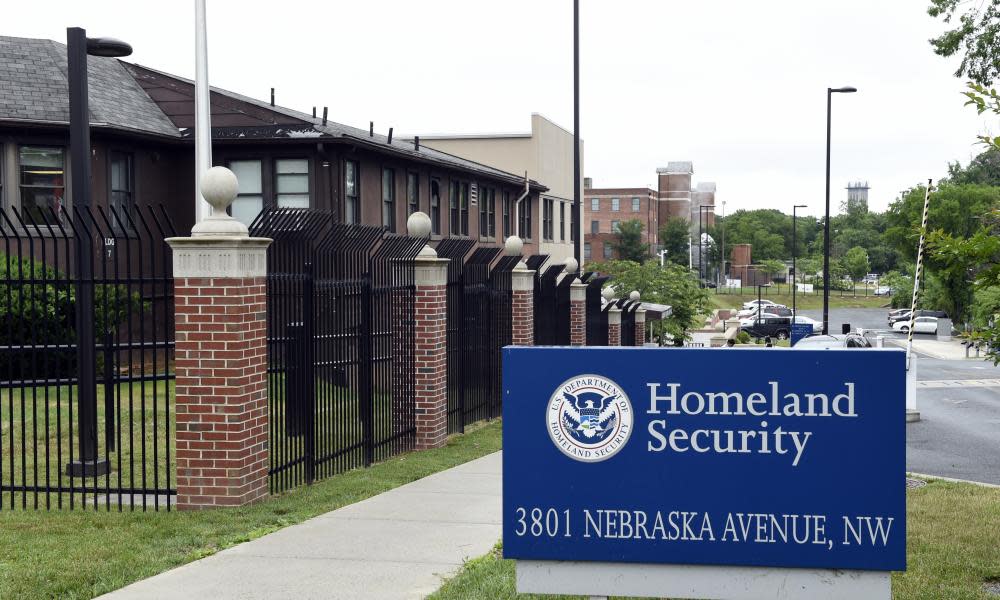Trump immigration database exposes crime victims' personal info, lawyers say

A new US immigration database has exposed the personal information of crime victims, putting them at risk of further violence and violating federal laws designed to conceal the identities of abuse survivors, according to a coalition of attorneys.
The online database – recently unveiled as part of Donald Trump’s anti-immigrant agenda and accessible to the general public – includes immigrant victims who have sought federal protections as survivors of human trafficking, domestic violence and sexual assault, activists said.
The US Department of Homeland Security (DHS) has a new system called the Victim Information Notification Exchange (Vine) that officials claim allows victims of crimes committed by immigrants to track the status of their perpetrators. But civil rights campaigners and attorneys have discovered that the database also includes immigrants who are crime victims themselves and are supposed to be shielded from public disclosures for safety reasons.
That means immigrants who have applied for relief under the Violence Against Women Act and other similar programs have had their private information exposed because they are undocumented. Attorneys fear that the database will allow abusers and traffickers to track the locations of their victims, interfere with their cases and inflict further violence.
“It has certainly put a very powerful tool in the hands of abusers,” said Archi Pyati, chief of policy and programs at Tahirih Justice Center, a nonprofit that provides legal services to immigrants and refugees fleeing violence. “Federal law says you’re not allowed to do this.”
Critics said this kind of Immigration and Customs Enforcement (Ice) searchable database broadly exposing victims is unprecedented and is the latest example of the Trump administration endangering the most vulnerable immigrants under the guise of public safety. Escalating fears of mass deportation and raids have pushed undocumented immigrants further underground, with increasing reports of immigrants refusing to report crimes, cooperate with law enforcement or speak up about worker exploitation.
The Vine database of people in DHS custody is part of Trump’s efforts to crack down on immigrants, including the rollout of a new office dedicated to “victims of immigration crime”. That’s despite research showing that immigrants are far less likely to engage in criminal activity than people born in the US.

Tahirih wrote to DHS on Thursday urging the agency to remove protected victims of violence from Vine or otherwise take down the entire database. Tahirih noted that the website includes detained immigrants who have applied for VAWA protection, U visas and T visas, which are programs that are supposed to allow victims of trafficking, violence and other crimes to safely report the abuse they faced and gain relief from deportation.
Under federal law, DHS is barred from disclosing any information about those applicants, advocates noted. But the Vine database allegedly allows members of the public to look up these immigrants’ personal information, including the facility where they are being held, the status of the case and the reason for the detention. Members of the public can also sign up for alerts so they are notified when an immigrant’s status changes.
Ice spokesman Thomas Byrd declined to comment on the groups’ claims about Vine, but told the Guardian in an email late Thursday: “When the agency receives evidence suggesting that non-releasable information is unintentionally available, immediate actions are taken to ensure proper mitigation both to correct and to prevent further disclosures.”
Byrd also declined to say whether Vine still includes protected victims in the database, but added that the agency “continually strives to ensure that information protected both by policy and law is never divulged”.
Tim Warden-Hertz, directing attorney at the Northwest Immigrant Rights Project (NWIRP), said his office has one client who has a pending application for a U visa for crime victims, but was still showing up in the database on Thursday afternoon. After the Guardian’s inquiries to Ice, that client was no longer searchable in Vine.
Another NWIRP client in the database was a confidential informant for law enforcement in the US and faces risks because of his cooperation. That individual remained in the database at the end of the day.
Both clients are in DHS custody because they are undocumented, said Warden-Hertz, who provided the Guardian with redacted records to back his claims.
“We’re really putting them in danger,” he said, arguing that detainees – the vast majority of whom don’t have lawyers – should not have the burden of forcing the government to comply with the law. He also noted that there were many vulnerable immigrants who might not be protected under VAWA or the other programs, but still required confidentiality, such as asylum seekers.
Tahirih said it first raised the issue to DHS two weeks ago, but no changes were made, prompting the Thursday letter.
After its launch, the DHS database also mistakenly included children, some as young as a few months, the Los Angeles Times reported in April.
Immigration advocates note that domestic abusers sometimes use their victims’ undocumented status against them by threatening to report them to Ice if they go to police. The information on Vine can make it easier for abusers to hinder victims’ efforts at gaining protection and can allow them to locate victims when they are released, critics said.
“We’re really concerned in the context of human trafficking,” said Grace Huang, policy director at the Asian Pacific Institute on Gender-Based Violence. “They’ll know where to pick them up.”
Warden-Hertz said that some defendants whose cases are shielded from the public in immigration court, to protect their safety, are now being exposed by a different entity of the federal government – the Vine database.
Immigrant crime victims apply for relief with the belief that the government will protect them, said Cecelia Friedman Levin, senior policy counsel with Asista Immigration Assistance.
“There’s an understanding that DHS is going to follow the laws that apply to them,” she said, adding: “We can’t allow this to stand.”

 Yahoo News
Yahoo News 
